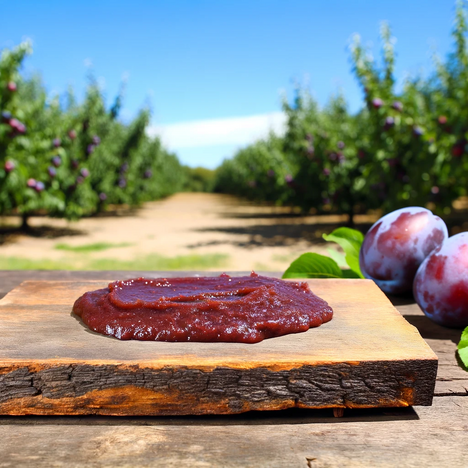Plum puree

What is plum puree?
Plum puree is a puree made from cooked and pureed plums. Plums are stone fruits that belong to the rose family and come in different varieties. They have an oval shape, a dark blue to purple skin and a juicy flesh with a sweet and sour taste. Plums contain many vitamins, minerals, fiber and antioxidants that are important for human and animal health.
What are the benefits of plum puree for dogs?
Plum puree can offer your dog various benefits if you feed it in moderation. For example, prune puree can:
- Aid digestion: Plum puree is high in fiber, which can stimulate bowel movements and prevent constipation. Plum puree also has a mild laxative effect, which can be helpful for dogs with hard stools.
- Boost the immune system: Plum puree is rich in vitamin C, which can support your dog's immune system. Vitamin C is also important for the formation of collagen, which is responsible for the health of skin, coat, teeth and bones.
- Protect cellular health: Prune puree contains many antioxidants that can protect your dog's cells from harmful free radicals. Free radicals are molecules that are produced by environmental factors or metabolic processes and can lead to inflammation, ageing or cancer.
- Support kidney function: Plum puree has a high potassium content, which is important for regulating water balance and blood pressure. Potassium also helps to eliminate excess sodium from the body, which can relieve the strain on your dog's kidneys.
What are the disadvantages of prune puree for dogs?
While prune puree is healthy for your dog, it is not without risks. For example, prune puree can:
- Lead to diarrhea: Prune puree has a strong laxative effect, which can lead to diarrhea or abdominal pain in sensitive dogs. You should therefore only feed plum puree in small quantities and pay attention to how your dog reacts to it.
- Lead to flatulence: Prune puree contains a lot of sugar and fruit acid, which can cause bloating or heartburn in some dogs. This is because dogs have a short intestine and cannot digest sugar and fruit acid well.
- Lead to an overdose of potassium: Plum puree has a high potassium content, which can lead to cardiac arrhythmia or muscle weakness if overdosed. This is especially true for dogs with kidney problems or heart disease, which do not need additional potassium.
How do you feed prune puree to dogs?
If you want to give your dog plum puree, there are a few things you should bear in mind:
- Feed only pure plum puree with no sugar or other additives. You can make your own plum puree by washing, stoning, cooking and pureeing plums. Or you can buy ready-made plum puree that is suitable for babies.
- Only feed small amounts of plum puree as a treat or supplement to your dog's normal food. A rule of thumb is that you should not cover more than 10 percent of your dog's daily calorie requirement with plum puree. This corresponds to about one teaspoon per 5 kilograms of body weight.
- Feed prune puree only occasionally and not daily. Too much plum puree can lead to the disadvantages mentioned above or impair the absorption of nutrients from the dog food.
- Only feed plum puree to healthy dogs without kidney or heart problems.
Plum puree is a delicious and healthy food that you can feed your dog in moderation. It can boost your dog's digestion, immune system, cellular health and kidney function. However, you should also be aware of the possible disadvantages of prune puree, such as diarrhea, flatulence or an overdose of potassium. Therefore, you should only feed prune puree in small quantities, occasionally and only to healthy dogs.
If you notice any signs of hypersensitivity or poisoning in your dog, you should see your vet immediately. We are not a substitute for a vet, but we try to be as accurate as possible. Every dog reacts differently and we recommend you get a second opinion or consult your vet if in doubt.
Stay healthy and take good care of your four-legged friend!😊